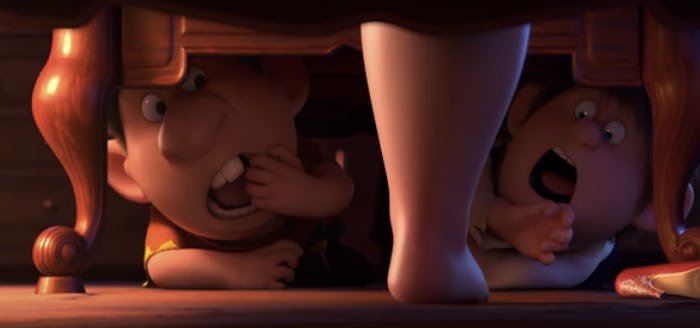Entertainment
New 'Snow White' Parody Criticized For Body-Shaming
It's obvious that marketing doesn't always get it right. Unfortunately, it looks like the marketing team behind the Red Shoes and the 7 Dwarfs failed the litmus test for body-positivity and acceptance... time and time again. To be more specific, the new Snow White parody movie seems to have a body-shaming message, according to the trailer, which has since been pulled from YouTube. And, photos of poster advertisements for the movie aren't really helping its case. The worst part of all of this is the potential negative impact it could have on kids, who are incredibly sensitive to messages about their own bodies. Locus Studios did not immediately respond to Romper's request for comment.
On Thursday, the parody found itself in the midst of some major controversy for its allegedly body-shaming trailer, which depicts the film's young characters judging a woman's body, according to a scathing review from Teen Vogue. To make matters even more disturbing, the movie's poster ad, which was debuted at the Cannes Festival, depicted a thin-looking Snow White next to a seemingly bigger version of herself, according to body-positive model Tess Holliday. Holliday tweeted out a picture of the ad with a clear view of its cringe-worthy caption, “What if Snow White was no longer beautiful and the 7 Dwarfs not so short?”
Obviously, the problem here is that the poster is implying the thinner version of Snow White is more "beautiful" than her fuller counterpart. Considering the film is marketed to children, this ad is particularly scary. The poster is essentially telling kids that they aren't attractive if they aren't thin. When you couple this scenario with DoSomething.org's claim that 91 percent of women are unhappy with their bodies, the result is heartbreaking.
As for the parody's trailer, Teen Vogue had this to say:
It shows the dwarfs hiding in Snow White's cottage, secretly watching her undress (which is a whole separate problem than the body shaming). As they watch her, the dwarfs are visibly excited as the slender Snow White disrobes, but when she takes off her shoes, the previously skinny woman is suddenly fatter. The dwarfs react in horror, implying that seeing a fat woman naked is gross or displeasing, but seeing the skinny woman is exciting and good. Again, the movie appears to be saying fat is ugly.
Once again, the film is putting forth the idea that larger women are grotesque while thinner women are to be desired. Not only is this problematic for fuller ladies, but it's also hurtful to skinnier women. The trailer essentially teaches children that thinner women are to be ogled at and objectified while larger women are to be shamed with horror and disgust. It's a lose-lose situation for everyone involved.
Following Holliday's outrage, Chloë Grace Moretz, who lends her voice to Snow White in the film, took to Twitter to address the controversy.
As for the "powerful" story Moretz makes reference to in her tweets, that remains to be seen. Although it's nice to see Moretz publicly disapprove of the marketing behind the film, it would have been even better for her to make a clear stand against body-shaming, as opposed to absolving herself from blame. What's more important here is assuring kids that all body types are beautiful.
In addition to Moretz, Locus Studios is also publicly addressing the outrage. Not only did the company pull the film's trailer from YouTube, but it also released apologies to multiple outlets.
One of the film's producers from Locus Studios, Sujin Hwang, released the following statement to Bustle:
As the producer of the theatrical animated film “Red Shoes and the 7 Dwarfs”, now in production, Locus Corporation wishes to apologize regarding the first elements of our marketing campaign (in the form of a Cannes billboard and a trailer) which we realize has had the opposite effect from that which was intended. That advertising campaign is being terminated.
Our film, a family comedy, carries a message designed to challenge social prejudices related to standards of physical beauty in society by emphasizing the importance of inner beauty. We appreciate and are grateful for the constructive criticism of those who brought this to our attention. We sincerely regret any embarrassment or dissatisfaction this mistaken advertising has caused to any of the individual artists or companies involved with the production or future distribution of our film, none of whom had any involvement with creating or approving the now discontinued advertising campaign.
Although Hwang's apology is a positive step forward, it's still mind boggling how the promotional materials for the movie made it past so many professional eyes without someone noticing the message they portrayed. If the public and some celebrities never expressed outrage over the alleged body-shaming, one can't help but wonder if Locus Studios would have corrected the error many believe it made.
For parents, the silver lining in this controversy is that it's another opportunity to teach kids the importance of respecting all body types. One Twitter user summed up the situation quite well, arguing that no one, especially not a movie, should try to impress negative body stereotypes on children.
Moving forward, one can hope this situation becomes an important lesson for movie studios. Body-shaming is never OK, and we need to be especially careful of the messages we're teaching children. The media should instead shift its focus to imparting body-positive images and anecdotes on younger generations so that rates of eating disorders and poor body-image in young girls decrease over time. Society deserves better, and so does its kids.
